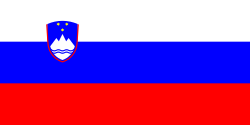| Slovenia at the Mediterranean Games | |
|---|---|
 | |
| IOC code | SLO |
| NOC | Olympic Committee of Slovenia |
| Medals Ranked 12th |
|
| Mediterranean Games appearances (overview) | |
| Other related appearances | |
Slovenia has sent athletes to every edition of the quadrennial Mediterranean Games since the nation's first appearance at the 1993 Mediterranean Games following its independence from Yugoslavia. As of 2022, Slovenian athletes have won a total of 218 medals.